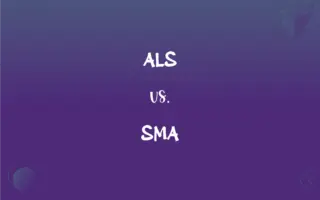Nondisjunction in Meiosis 1 vs. Nondisjunction in Meiosis 2: What's the Difference?
Edited by Aimie Carlson || By Harlon Moss || Published on February 13, 2024
Nondisjunction in meiosis 1 involves homologous chromosomes failing to separate, while in meiosis 2, sister chromatids don't separate.

Key Differences
This occurs when homologous chromosomes do not separate properly during the first meiotic division. As a result, one daughter cell receives two copies of the chromosome, and the other receives none.
In this scenario, sister chromatids fail to separate during the second meiotic division. This leads to one daughter cell with an extra chromosome and another with one less.
Nondisjunction in meiosis 1 can result in more severe genetic abnormalities than nondisjunction in meiosis 2 because the entire chromosome set is affected from the beginning.
Nondisjunction in meiosis 1 affects all resulting gametes, while nondisjunction in meiosis 2 affects only half of the gametes.
Certain genetic disorders are more likely to result from nondisjunction in meiosis 1 than meiosis 2, due to the broader distribution of chromosomal irregularities.
ADVERTISEMENT
Comparison Chart
Stage
Occurs during Anaphase I
Occurs during Anaphase II
Chromosomes Involved
Homologous chromosomes
Sister chromatids
Resulting Gametes
All gametes affected
Half of the gametes affected
Genetic Variability
High variability
Less variability
Frequency
Less common
More common
ADVERTISEMENT
Nondisjunction in Meiosis 1 and Nondisjunction in Meiosis 2 Definitions
Nondisjunction in Meiosis 1
An error in meiosis 1 where homologous chromosomes don't separate.
In Down syndrome, nondisjunction in meiosis 1 leads to an extra chromosome 21.
Nondisjunction in Meiosis 2
An aberrant event in meiosis 2, impacting chromosomal separation.
Klinefelter syndrome can be caused by nondisjunction in meiosis 2.
Nondisjunction in Meiosis 1
The failure of chromosome pairs to segregate in meiosis 1.
Nondisjunction in meiosis 1 can cause trisomy 18, leading to developmental issues.
Nondisjunction in Meiosis 2
An error in meiosis 2 where sister chromatids fail to separate.
In some cases of Down syndrome, nondisjunction in meiosis 2 is the cause.
Nondisjunction in Meiosis 1
A chromosomal mishap during the first division of meiosis.
Turner Syndrome can result from nondisjunction in meiosis 1, where one X chromosome is missing.
Nondisjunction in Meiosis 2
A chromosomal division error during the second meiotic division.
Nondisjunction in meiosis 2 can lead to an individual having 47, XXY chromosomes.
Nondisjunction in Meiosis 1
A meiotic error where chromosome pairs don't split in the first division.
Nondisjunction in meiosis 1 can lead to triple X syndrome.
Nondisjunction in Meiosis 2
The failure of sister chromatids to segregate in meiosis 2.
Nondisjunction in meiosis 2 can result in Turner Syndrome with a missing X chromosome.
Nondisjunction in Meiosis 1
An anomalous event in meiosis 1, affecting chromosome distribution.
Klinefelter syndrome may originate from a nondisjunction event in meiosis 1.
Nondisjunction in Meiosis 2
A meiotic error in the second division affecting chromatid distribution.
Triple X syndrome may occur due to nondisjunction in meiosis 2.
FAQs
Is nondisjunction in meiosis 1 more severe than in meiosis 2?
Often yes, as it impacts the entire set of chromosomes from the start.
What is nondisjunction in meiosis 1?
It's a genetic error where homologous chromosomes don't separate during the first meiotic division.
How does nondisjunction in meiosis 2 differ from meiosis 1?
It occurs when sister chromatids fail to separate during the second meiotic division.
Can nondisjunction in meiosis 2 affect all gametes?
No, it typically affects only half of the gametes.
What disorders are associated with nondisjunction in meiosis 1?
Disorders like Turner Syndrome and Trisomy 18 can result from this error.
What are the consequences of nondisjunction in meiosis 1?
It can lead to disorders like Down syndrome, due to abnormal chromosome numbers in all gametes.
Can nondisjunction in meiosis 2 lead to Down syndrome?
Yes, it's one possible cause of Down syndrome.
What role does nondisjunction in meiosis 2 play in genetic disorders?
It leads to disorders by producing gametes with abnormal chromosome numbers.
Can nondisjunction in meiosis 1 occur in any chromosome?
Yes, it can occur in any of the homologous chromosomes.
Are there specific chromosomes involved in nondisjunction in meiosis 2?
It involves sister chromatids, not specific chromosomes.
What factors influence nondisjunction in meiosis 1?
Factors like age and environmental elements can influence it.
Does nondisjunction in meiosis 1 always lead to genetic disorders?
Not always, but it significantly increases the risk.
How common is nondisjunction in meiosis 1 compared to meiosis 2?
It's less common than nondisjunction in meiosis 2.
What genetic variability results from nondisjunction in meiosis 1?
High variability, as it affects chromosome sets from the beginning.
Is Klinefelter syndrome related to nondisjunction in meiosis 1?
It can be, although it's also associated with nondisjunction in meiosis 2.
Can nondisjunction in meiosis 2 be detected prenatally?
Yes, through genetic testing methods like amniocentesis.
Do both types of nondisjunction have the same occurrence rate?
No, nondisjunction in meiosis 2 occurs more frequently.
Can nondisjunction in meiosis 2 cause Turner Syndrome?
Yes, it's one of the causes of Turner Syndrome.
Are the effects of nondisjunction in meiosis 2 always visible?
Not necessarily; some effects may be subtle or undetectable without testing.
How does nondisjunction in meiosis 1 affect genetic diversity?
It increases genetic diversity due to varied chromosomal distributions.
About Author
Written by
Harlon MossHarlon is a seasoned quality moderator and accomplished content writer for Difference Wiki. An alumnus of the prestigious University of California, he earned his degree in Computer Science. Leveraging his academic background, Harlon brings a meticulous and informed perspective to his work, ensuring content accuracy and excellence.
Edited by
Aimie CarlsonAimie Carlson, holding a master's degree in English literature, is a fervent English language enthusiast. She lends her writing talents to Difference Wiki, a prominent website that specializes in comparisons, offering readers insightful analyses that both captivate and inform.































































